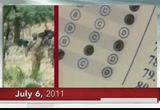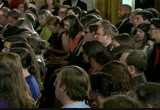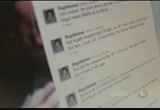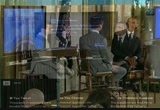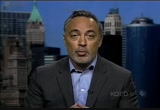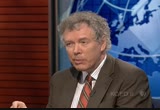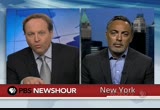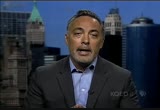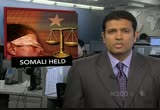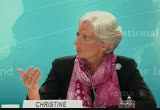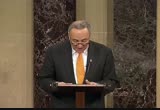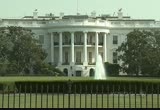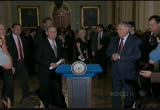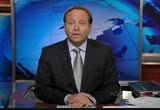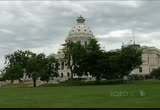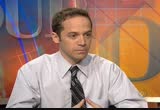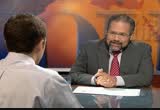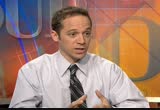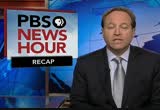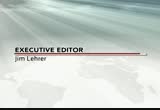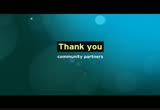tv PBS News Hour PBS July 6, 2011 3:00pm-4:00pm PDT
3:00 pm
captioning sponsored by macneil/lehrer productions >> brown: it was part town hall meeting, part press conference and part tech experiment as president obama took questions from americans via twitter today. good evening. i'm jeffrey brown. >> ifill: and i'm gwen ifill. on the "newshour" tonight, we look at the evolving nexus between social media and politics and what politicians and voters each get from this wired relationship. >> brown: then, kwame holman updates the state-of-play in the federal deficit negotiations in washington. >> ifill: judy woodruff examines how minnesota's government shutdown foreshadows state budget woes nation wide. >> brown: we get the latest on the investigation of widespread cheating in the atlanta public school system from heather vogell of the "atlanta journal constitution."
3:01 pm
>> ifill: from sudan, an on-the-ground report on new clashes as the southern part of the country prepares for independence saturday. >> brown: and ray suarez talks to david epstein of "sports illustrated," as former pitching great roger clemens faces charges of lying to congress about taking performance- enhancing drugs. that's all ahead on tonight's "newshour." major funding for the pbs newshour has been provided by: >> i mean, where would we be without small businesses? >> we need small businesses. >> they're the ones that help drive growth. >> like electricians, mechanics, carpenters. >> they strengthen our communities. >> every year, chevron spends billions with small businesses. that goes right to the heart of local communities, providing jobs, keeping people at work. they depend on us. >> the economy depends on them. >> and we depend on them.
3:02 pm
>> and by the bill and melinda gates foundation. dedicated to the idea that all people deserve the chance to live a healthy productive life. and with the ongoing support of these institutions and foundations. and... this program was made possible by the corporation for public broadcasting. and by contributions to your pbs station from viewers like you. thank you. >> brown: for a little over an hour today, the commander-in- chief was also the tweeter-in- chief. president obama took his latest step into new media using twitter to field public inquiries directly. in the hours before the town hall began, tweeted questions for the president were rolling in-- 140 characters or less at a time. that's the format for twitter-- a micro-blogging and social
3:03 pm
networking service that was founded in 2006 and has mushroomed in popularity. it now boasts more than 200 million registered users with the same number of tweets per day being sent-- the equivalent of a 10-million page book. >> hello, everybody! >> brown: for today's event: users from all over sent in their questions, a handful were picked and then posed by twitter co-founder jack dorsey to the president, who answered verbally without the 140 character limit. >> you know, that's a terrific question... >> brown: aides, however, did tweet shortened versions of his responses. many of today's questions focused on jobs and the economy. >> it comes from david: tech and knowledge industries are thriving, yet jobs discussion centers on manufacturing. why not be realistic about jobs? >> we have to be successful at the cutting edge industries of the future like twitter. but we also have always been a
3:04 pm
country that makes stuff. what we want to focus on is advanced manufacturing that combines new technology and research to see how are we going to create the next twitter, create the next google, how are we going to create the next big thing? but make sure that production is here. >> brown: it was the third such social media event for the president this year. in april, he took part in a town hall hosted by facebook, and in january, he answered video questions submitted via youtube. for the president and other politicians and leaders, twitter especially has become an increasingly essential communications tool. republican mitt romney used the service in early june to announce to his followers he was running for president. and then, to keep them in the loop about campaign events. and with more than half a million followers, former vice presidential candidate sarah palin is a frequent user, sometimes posting multiple times a day. but there are also cautionary
3:05 pm
tales including, most recently, congressman anthony weiner, whose tweeted sexual messages and photos opened him to ridicule and ended in his resignation. >> now, our next question comes from someone you may know-- this is speaker boehner. >> oh, there you go. ( laughter ) >> brown: as for today's town hall, some of the president's political opponents took advantage of the publicity to tweet their own challenges. house speaker john boehner asked, "after embarking on a record spending binge that's left us deeper in debt, where are the jobs?" the president, of course, had a ready answer. >> obviously, john's the speaker of the house, he's a republican, and so this is a slightly skewed question. but what he's right about is that we have not seen fast enough job growth relative to the need.
3:06 pm
>> brown: according to the white house, more than 60,000 tweets had been sent in to the event by noon and many more came in even as the event unfolded. more now on the links between social media and politics, from andrew rasiej, an entrepreneur and technology strategist. he is co-founder of personal democracy forum, and the blog "tech-president," which reports on how technology is changing politics, government and society. darrell west heads the brookings institution's centers for governance studies and tech innovation. and cecilia kang is technology reporter for the 'washington post." she was at the white house for today's event. cecilia, i'll start with you because you were there. one clarification. the questions that were coming in, how were they picked and how much do we know about whether they were filtered for content or diversity of topic, et cetera? >> well, twitter did have the last say on what questions would be served up and asked to the president. but what they did is took pains to explain they had a search
3:07 pm
algorithm as well that searched for the most common and popular subjects and questions and they did that by searching what kinds of questions like john boehner's house representative john boehner's question, was retweeted and repeat sod many times, there's such a fertile discussion around his question. that made his question pop to the top of the list. so that's how they actually chose the questions. but ultimately twitter had the last say on what questions would ultimately be served and asked to the president. >> brown: andrew rasiej, when you look at something like this, what is the potential benefit for this kind of communication between a president or any political leader and the public? >> well, any political leader needs to use the technology, the communication technologies, that the citizens that he represents uses so what fire side chats were to roosevelt, social media has the potential of being for president obama and the reality of social media is that it
3:08 pm
creates an opportunity for a much more robust interaction and interactive environment for citizens to not only engage with politicians but for there to be more transparency about the communication and for politicians to actually be able to listen better, to be able to hear what the constituents are actually thinking. >> brown: darrell west, i heard the word "engaged." that's a question. how much actual engagement is there in this transection? what are the advantages but also what are the limitations here? >> there is a lot of engage. but i think what we saw today also shows some of the lilt stations of social media. people were limited to 140 characters. so the questions were pretty simple. they lacked the nuances that you often get from a more professional media asking those types of questions and then on obama's side, his questions were his canned campaign speeches. so, you know, there wasn't a lot of news that came out of this. but i think what all this really illustrates is politicians and journalists haven't figured out
3:09 pm
how to use the social media. they can use in the much more substantive ways than they are using it today so... and i think that over the long run we see them use in the a more sophisticated way. >> brown: you've been watching the white house with the use of social media. what do they say they're trying to get out of an event like this? what do they say this is for? >> they want to reach more people, and as many people as they can particularly ahead and going into the presidential election of 2012. twitter is a really valuable resource for them in that people on twitter... first of all, the platform itself is growing tremendously. 13% of all online users use twitter. and that's up from just six months ago where only 8% of all online users were on twitter. so it's a fast-growing platform and the people who use twitter are very engaged politically and they tend to be demographic that these voters... that the administration would like to get
3:10 pm
their attention from. >> brown: andrew rasiej, what does it tell us and not tell us about the pulse of america? is it analogous to a poll? are we learning something about what americans are concerned about or is it a very small focus group? well >> well, political opinion is formed by people talking to each other and many of them are doing it on social media. for any politician to use social media, they're actually getting a realtime view, a realtime sense of what is being discussed and what the public is thinking about or worried about. the trick is is actually using technology not just as a broadcast media and as most politicians are doing but also using it as a listening post and to really understand the dynamics of the communication process of... among people so that they don't actually use it only for one hour. i mean, frankly, the white house is struggling a little bit with 20th century communication techniques meeting up with 21st century communication techniques and staging these events which
3:11 pm
are great first steps but the president should really be tweeting all the time. he does occasionally but.... >> brown: tweeting all the time? isn't he a little busy for that? don't we want him to be too busy for that? >> i'm not suggesting he tweets every minute of the day. i'm suggesting incorporating it into his life. he writes letters everyday, he answers the phone everyday, he's communicating and it's important for the president to use every available tool. but he's not present on social media quite to the same degree as other politicians have learned to use in the a way that allows them listen on a regular basis to what's being said by the american public. >> brown: what do you think about this question... what these questions tell us about americans? do we learn about their actual concerns here? >> the questions that came up today are the types of questions that if you do a random public opinion survey people are interested in: jobs, the economy taxes, the deficit. that is the general subject matter that engages people. so i think that what we saw today were people kind of
3:12 pm
raising the types of issues that are on the minds of the general public. >> brown: it's not a scientific poll, though, right? i mean, this is... it's whoever writes in. >> it's not a scientific survey. we know social media users do skew younger in general. there are older people signing up for facebook that are going to youtube and are using twitter but in general politicians like to use social media because it allows them to expand the pool. is the people who use social media are not the people who watch television or read newspapers. >> brown: cecilia, there's another aspect to this because you covered the technology field here. what is twitter after? this is a commercial... this is a business and it's on a high stage on something like this. >> there was little down side for twitter. twitter won from this. twitter got perhaps the biggest endorsement of its technology from the president of the united states. showed that really by hosting this event, this town hall on its platform it was an endorsement of really its clout, if you will. how important it's become,
3:13 pm
twitter. and twitter as a private company is heading into an i.p.o., is going to get a lot more publicity for the company as it goes forward and it probably will track more users and if obama live tweets on the platform as he did today, that is only more publicity and really more validation of how important the service has become >> brown: what about what the consumer has to know here? when you send out your tweet, it's out there, right? i mean, this is not a private comment. it can be tracked. >> as one politician learned the hard way recently, it is very much public. it is permanent. this is... you know, these things are etched in the internet. you'd think these things kind of vaporize and go away, but what is said on twitter, what is tweeted on twitter, what is sent as a picture, these things are permanent records. and so, you know, there's a whole sort of orchestration on how it works. it can be confusing for the average user.
3:14 pm
but i would say that the president's move into it sending really his second only tweet today is... it's a step. it's a first step. but you see with many politicians heading into election, getting into it it's only going to become more popular. >> brown: andrew, do you think this is with us here to stay? >> absolutely. and the reality of it is that technology allows for a much more robust and transparent relationship... communications relationship between politicians and voters where they can see what each other is thinking and they can actually understand whether a politician is being authentic and communicating in a way that's relevant and not abstract or necessarily soundbited by traditional media. but one other very important point which is that obama during the presidential campaign used social media very, very well. they raised a lot of money online, they used the internote help get people out to the polls and to organize and the operative word for the president during the campaign was "we." and it seems to some degree that when the president went into office that they kind of
3:15 pm
switched a little bit to using the word "i" and as they entered the new presidential election cycle, i think the president has an opportunity to reengage with his core constituency and show once again that we is a reflection of how social media can be used to build a better and more robust democracy. >> brown: a brief last word, darrell west, that's true for all politicians going forward, right? >> it is true. the hallmark of the current era is the age of cynicism. there's a big gap between leaders and voters. so the long-term potential of social media is to bridge that gap, to draw leaders so they can listen to people and give ordinary people a chance to engage people and explain. >> brown: limitations and all that you talked about. >> absolutely. >> brown: darrell west, andrew rasiej, cecilia kang, thank you very much. >> ifill: still to come on the "newshour": high stakes deficit negotiations; budget woes in minnesota; the massive cheating scandal in atlanta's schools; southern sudan prepares for independence and the roger clemens perjury trial.
3:16 pm
but first, with the other news of the day. here's hari sreenivasan. >> sreenivasan: president obama announced today he'll begin sending condence letters to families of soldiers who commit suicide in combat zones. the decision reversed a policy that's been in place for years. military suicides have risen during the long-running wars in iraq and afghanistan. in his statement today, the president said, "these americans served our nation bravely. they didn't die because they were weak." a federal appeals court in san francisco has ordered the military to stop enforcing its ban on gays serving openly. congress repealed the policy last december, but it won't take full effect until the president certifies that the armed services are ready for the transition. it was unclear what effect today's appeals court ruling will have on that timetable. the u.s. capture of a somali suspect triggered a new dispute today over the handling of terror cases. the "new york times" and the "washington post" reported that ahmed abdulkadir warsame was captured in april and held on a u.s. warship, where intelligence officials questioned him for two months.
3:17 pm
warsame was then flown to new york to stand trial in federal court. but senate repubulican minority leader mitch mcconnell said today he should have been sent to guantanamo and a military tribunal. >> the administration has purposefully imported a terrorist into the u.s. and is providing him all of the rights of a u.s. citizen in court. this ideological rigidity being displayed by the administration is harming the national security of the united states of america. >> sreenivasan: in turn, the senate's number-two democrat dick durbin defended the president's actions. he said mr. obama is doing exactly what his predecessor president bush did repeatedly. >> to come here and second guess the president because he's held a man for two months in military interrogation and now is being prosecuted in our criminal courts is totally unfair. unfair because the same standard was not applied to the republican president who tried hundreds of would be terrorists, accused terrorists, in our criminal courts successfully.
3:18 pm
>> sreenivasan: administration officials said once warsame was handed over to the f.b.i., he was read his miranda rights, and the interrogation started over from scratch. what he said from that point on can be used in court. the u.s. army psychiatrist charged in the deadly fort hood shootings will be tried in a military court. and, he will be subject to the death penalty. that word came today from the commanding general at the texas military post. major nidal hasan is charged with 13 counts of murder and 32 counts of attempted murder in the november 2009 shootings. he is being held in a civilian jail. hasan was paralyzed from the waist down after police shot him during the attack. the new head of the international monetary fund pledged today to diversify the organization and give developing nations more of a voice. christine lagarde had been the french finance minister, and she is the first woman to run the i.m.f., since its founding in 1945. she spoke today in washington. >> diversity is multifaceted. it's not just about gender, color, religion, sexual
3:19 pm
preferences, but it's also about culture. it's also about academic background. and i think that we need to draw on the resources and the intellect developed in many corners of the world, because that will make us better and richer. >> sreenivasan: lagarde replaced dominique strauss-kahn, who resigned after being accused of sex crimes in new york. he has now been released from house arrest, amid rising questions about the case against him. prosecutors and defense attorneys met today to discuss what happens next. wall street managed new gains despite word of slower growth in the service sector. the dow jones industrial average gained 56 points to close at 12,626. the nasdaq rose eight points to close at 2,834. they were still cleaning up in phoenix, arizona today, after one of the largest dust storms in the region's history. last night, winds of 60 miles an hour whipped up a massive wall of dust nearly two miles high, and 100 miles wide. the dust storm coated cars and buildings, severely reduced
3:20 pm
visibility and grounded flights for hours. it was spawned from an earlier storm near tucson. those are some of the day's major stories. now, back to gwen. >> ifill: one day before congressional leaders are to meet with president obama for new deficit reduction talks, members from both parties were holding their ground. "newshour" congressional correspondent kwame holman has the latest. >> reporter: the u.s. senate gave up its fourth of july recess this week, to focus on raising the national debt ceiling. but there was no sign today that agreement is near on the basic divide-- over tax hikes versus spending cuts. >> we must do something, and we must do something about the real problem, spending and debt. washington, in a bipartisan way, has a spending problem. the fundamental problem isn't that we're under-taxed. >> here's what it's coming down to, in the home stretch of negotiations, our republican colleagues seem to be willing to
3:21 pm
tank the economy rather than end a single tax subsidy. democrats are committed to reducing deficit, getting our nation back on a sensible fiscal track, but we know that everyone must pay their fair share. >> reporter: at issue is how to cut the deficit by more than $2 trillion as part of any deal to increase the nation's borrowing authority. lawmakers are now less than four weeks away from the august 2nd deadline to act or risk a default on the federal debt. with time running out, the president yesterday invited a bipartisan group of house and senate leaders to the white house to resume negotiations thursday. in doing so, he rejected talk of a short-term deal, telling lawmakers not to "kick the can down the road." instead, he said they should seize the opportunity to do something big. formal talks broke off two weeks ago, but there have been behind- the-scenes contacts, including a face-to-face meeting between the president and house speaker john
3:22 pm
boehner last sunday. at his twitter town hall today, the president kept up the pressure on republicans charging again that they're defending tax breaks for the few, at the expense of the many. >> debt ceiling should not be used as gun against head of american people to extract tax breaks for corporate jet owners, oil and gas companies i'm happy to have those debates, think american people are on my side balanced approach where everything is on the table. >> reporter: in response, house majority leader eric cantor insisted republicans are willing to eliminate wasteful or ineffective tax breaks. he said, "if the president wants to talk loopholes, we'll be glad to talk loopholes." and senate republican leader mitch mcconnell called for
3:23 pm
large-bore changes in tax policy. >> i'm open to tax reform, we need to do it broadly. to cherry pick certain items in this context strikes me as pretty challenging. everybody's going to have to contribute to it in some way or another. it's going to have to have broad impact on every aspect of our society in order to get this problem under control. >> reporter: still, republican leaders insist any revision to the tax code must not result in a net tax increase. in the meantime, the president today dismissed any notion that he might act unilaterally-- raising the debt ceiling by executive order. >> brown: next, from the federal fiscal crunch to the budget woes faced by many states. in minnesota, in fact, the
3:24 pm
government continues to be shutdown amid a budget stalemate. judy woodruff has our story. >> woodruff: the government shutdown in minnesota stretched into a sixth day today as the state's democratic governor, mark dayton, and republican lawmakers remained at an standstill over spending and taxes. after an hour of talks yesterday -- the first since the government closed friday-- the two sides reported little progress. >> i will consider anything that shows a realistic prospect of producing an outcome as soon as possible, that gets people working, gets state government back to functioning again. >> we're here to talk about the h.h.s. budget, the education budget, the next two days get that wrapped up. get a lights on bill passed. pass the bills we agreed to. get our job done and get out of st. paul. >> woodruff: republicans want to cap state spending at $34 billion-- the amount the state is expected to bring in the next two years. dayton has proposed increasing
3:25 pm
taxes on high earners to raise an additional $1.8 billion to cover growing demand for state services and avoid cuts to social programs and public universities. the impasse left many minnesotans frustrated over the holiday weekend, as many visitors to state parks were turned away. >> well, it's ridiculous, so obviously... >> it's sad. >> woodruff: karen johnson and >> i think the government needs to get their act together and come up with a budget. it's a matter of not doing your job, i think. >> woodruff: more than 20,000 state employees have been furloughed as officials try to resolve a projected $5 billion deficit over the next two years. >> i want them to know that we're here, we want to work. public employees want to work, we want to do our jobs. we're proud public employees we do our jobs and we do it well, now do yours. >> woodruff: in the meantime, back at the state capitol in st. paul, dayton and g.o.p. leaders resumed negotiations this afternoon.
3:26 pm
for more on those negotiations, we are joined from minneapolis by rachel stassen-berger, political reporter for the "star tribune." and to look at how minnesota's budget battle compares to the rest of the country, we are joined by susan urahn, managing director for the pew center on the states. and we thank you both for being with us. rachel, in minneapolis, i'm going to begin with you. give us more of a sense of how disruptive this government shutdown is. how much havoc has been created? >> well, it's affected minnesota in ways big and small. from little things like all the lottery tickets have been pulled to from the shelves to bigger things like nonprofits are unsure if they're going to get their state funding, which may hurt their clients. a lot of private businesses are wondering what's going to happen with their state contracts. even the loggers in minnesota's north are suing to essentially be able to continue to logging
3:27 pm
some of the land. >> woodruff: what about state employees, who's affected? >> there are about 20,000 state employees who have been laid off. it's not a furlough, it's a full layoff. they're applying for unemployment. if this ends they will be able to go back to their jobs but, frankly, nobody knows how long it's going to take to end. then there are other employees who are still at work and they're basically filling double shifts and trying to get everything done that the rest of the employees didn't. >> woodruff: what exactly does this dispute between governor dayton and the republican state lawmakers boil down to? what... give us each side of this argument >> well, sure. first you have to know that we have a $5 billion deficit which is kind of significant. the state has been... the republicans want to spend about $34 billion and so cut a lot of programs, make some shifts to make sure that we are not raising taxes to get this settled. they say that raising taxes is absolutely the wrong thing to do
3:28 pm
in this very fragile economy. governor dayton, on the other hand, says that there are valued programs that would be lost and he's talked about draconian cuts that the republicans want to put in place. he's offered... he has had a tax increase proposal on just the wealthy. he whittled it down to just millionaires, that was rejected. today he actually came out with a second option which is a cigarette tax increase. now, the republicans say any tax increase at all is a non-starter. >> woodruff: are they coming closer together or farther apart? what's your read on it? >> it actually seems like there's been steps backwards since the shutdown started. last week they were in intense negotiations behind closed doors. they were saying very little to the media. this week they're saying a lot to the media and the word today is "backwards." the republicans are not happy. dayton says that he's been misrepresented. there just doesn't seem like there's a cordial attitude going on right now and it makes it
3:29 pm
even less clear when the shutdown would end. >> woodruff: and, rachel, where's the public of minnesota? where are the citizens of the state on this? have you seen public opinion polls? >> we haven't done a public opinion poll. but, you know, i think there are a mix of reactions. first of all, there's a lot of frustration out there. similar whitey bulger hasn't lawmakers and the governor gotten this done? there's also some anger. some orth it is partisan, blaming the governor, blaming republicans who control the legislature. but i think there's... minnesota had this reputation as a state that works and now we're just idled. >> woodruff: let me turn with susan urahn with the pew center on the states because you look at the entire country. how does minnesota's situation compare to other states having budget problems? >> well, i think minnesota is a little bit of an out lie they are year for a couple reasons. one is that it's very unusual to have a government shutdown. you've only seen a half dozen of these over the last ten years. the other is that minnesota was virtually the only state that didn't get its budget signed on
3:30 pm
time at the end of the fiscal year which, again, is... it's a... it's a little bit of a sea change from what we've seen over the last couple years where states do have a hard time closing budgets but this year it was just minnesota. and then i think it's also sort of the focus of the debate which is how to close the budget gap and the role of tax increases. it's a very intense debate in minnesota. we've not seen, necessarily, much of that debate in other states across the country. >> reporter: why is it different in minnesota? why do you think it's harder there than it was in these other states? >> i think you can take a look at a couple things. you can look at the fact that we saw a very major shift in the last election so you have republicans now controlling both branches of the legislature and the governor's office in 20 states. you have a lot of governors who signed now no new tax pledges and, you know, republicans and in some case democrats-- governor cuomo in new york-- came in and said "no new taxes." so i think many many cases folks have taken taxes off the table as a way to sort of deal with
3:31 pm
the budgets and what they're talking about is cuts. so if you're going to have a disagreement about how to close a budget, you're very unlikely to do that unless you have divided government. we just have a lot less divided government than we did two years ago. you have that in minnesota. it's necessary but not sufficient. >> woodruff: and where you do see this tax is still on the table and still the subject of a live debate, have other states been able to figure that out? >> well, it's... again, we're just not seeing as much conversation about taxes. so, for example, in new jersey the legislature did deliver a tax increase proposal to the governor, but he vetoed it. and, you know, given the role of the governor in new jersey, he was able to do that and it stood. but a n a lot of cases, we're just not seeing taxes being used as a tool for closing the t budget gap. >> woodruff: instead you're seeing deeper spending cuts. and what kinds of things are you seeing that maybe weren't cut in the past? >> well, i think you're seeing significant cuts on the medicaid
3:32 pm
sides where states can. you looking at arizona. significant cuts to education. higher ned particular. >> pelley: layoffs. >> double-digit tuition increases coming up across the country in public systems. >> woodruff: and is there a lesson, susan urahn, in what's happening in minnesota for other states or vice versa? >> well, i'd go back to what rachel was saying about the public. we did a study last year looking at where the public was in fiscally stressed states and what the public wants more than anything is they want government to run well. they want efficient and effective government. they want it to operate smoothly. this is not an example of government operating very smoothly and i think the public's trust in government is very low and this is not going to help. >> woodruff: very quickly back to you, rachel stassen-berger. in minneapolis, what do you look for next? is there even a meeting scheduled? >> my guess is that they will continue meeting and eventually is a break through.
3:33 pm
but, you know, we are the epitome of divided state right now. not only did we have last november's election as susan talked about that split the governors in one hand and the legislature in the other hand but we're also the state of two statewide recounts. you will remember coleman/franken and we did have a government shutdown in 2005 as well. this is a state trying to figure out how to make it work. >> woodruff: well, we will keep watching and i know you will. rachel stassen-berger in m.p. with the starr tribune and susan urahn here in washington with the pew center on the states. thank you. >> ifill: now, an exhaustive new report reveals nearly two hundred educators cheated to boost student test scores in atlanta-- a problem that has surfaced in school districts across the country. the georgia investigation, commissioned by governor nathan deal, found results were altered on state curriculum tests by district administrators, principals and teachers, for as long as a decade.
3:34 pm
educators literally erased and corrected students' mistakes to make sure schools met state- imposed testing standards. and it found evidence of cheating in 44 of the 56 schools examined for the 2009 school year. the "atlanta journal constitution" has been digging to the inconsistencies for more than two years. reporter heather vogell joins me now. welcome, heather. so tell me, how did all of this surface? you have been spending a lot of time reporting on this? >> yes, we first wrote about suspicious scores in at an la a school back in december of 2008 and we did an additional analysis in 2009 and the state started their investigation in 2009. so this has been something that's been out there for a while. but i don't think any of us realized quite how pervasive the problem was. >> ifill: and the response
3:35 pm
before has been denial when your stories first came out? >> yes. denial. this slowly, as time has gone by we've gotten more admissions of... you know, some cheating here and there, there's an educator who, you know, will do the wrong thing occasionally and as time has gone by and more and more has come out there's been a little bit more concession that there is a more widespread problem. but even today i'm not quite sure that we've gotten really a full... that there's been anybody who's admitted in the district administration that this was really an incredibly serious, serious problem. >> ifill: well, you recount things like teachers, administrators, educators putting on gloves so their fingerprints wouldn't be detected or cheating parties where people would get together and change the results. right, exactly. i mean, what was amazing to me
3:36 pm
in this report was how organized it was and how groups of people were getting together. this wasn't just something happening in the classroom or happening in the closet. one person taking it upon themselves to do something sneaky because they were worried about a couple kids in their class who weren't going to do well. this was organized, it was yearly in some cools and it was an open secret in some schools. >> ifill: was it per vaseive? you've found where this report finds 178 educators including three dozen principals involved. in the size of the school... what is the size of the school system and how pervasive do these numbers indicate this has been? >> i think pretty pervasive. i believe there are around a hundred schools in atlanta right now and i think about around 80 of them are elementary and middle and those are the types of school that were examined by the investigators. the elementary and mid-level. >> ifill: did the investigators find out this had an an
3:37 pm
affect... i guess the students who couldn't read end up getting promoted. did it actually change the numbers of overall academic performance in the school system? >> it did change the numbers. you know, the investigators say that because of what they found they believe that much of the progress atlanta has been touting over the last ten years on these curriculum tests has been-- i think their phrase was ill-gotten. that this could have had an impact on the overall district, their appearance of how they were doing. and for individual students it certainly would have an affect on the trajectory of their education. kids who failed the c.r.c.t., which is our state curriculum test, they get extra help when they're flagged by failing. it's actually an important thing the fail if you're not ready to meet the standards for your
3:38 pm
grade. when somebody changes your answers and nobody knows that you're struggling as much as you are you don't get the extra help. >> ifill: what are the pressures on educators to do this sort of thing? is it a pressure that was brought by the school superintendent? brought by the state or internal? >> i think that what really happened here was... i don't know that it's unique because educators everywhere are under a lot of pressure in public schools now and everybody knows that. you have no child left behind. but there was sort of a culture that sort of brewed within atlanta public schools that was more intense and more dangerous than other places. according to the investigators that was a tone set by leadership. they gave three key reasons why they believe cheating flourished as much as it did in atlanta. one was that the district set its own test score targets that were harder to meet than the
3:39 pm
ones that the state and federal government set. so they were even higher. secondly there was a culture of retaliation and intimidation that wellly flourished within the hallways of the schools. anybody who questioned the means or methods schools were using to achieve certain gains was shuned if they were lucky, fired if they weren't lucky. and third they also said that dr. beverly hall, the superintendent and her senior staff emphasized praise, success performance and her image and the district image over the integrity of the tests. that they didn't emphasize honesty enough. >> ifill: she has just left this job and there's an acting superintendent in charge. do we know that she personally knew and districted this kind of behavior? >> reporter: i think people are still trying to figure out exactly what she knew and the investigators, as close as they
3:40 pm
got to that, was to say that she knew or should have known. there are questions about whether she was in a meeting, for instance, where cheating was discussed. the results of an internal investigation. and there's questions about whether she should, as an educator with... a veteran educator with a lot of experience, a lot of training and knowledge of data she should have recognized the signs that these scores were not valid. >> woodruff: is there prosecution possible in this? have laws been broken? >> it's possible. i can't say whether laws were broken or not. but there are three d.a.s that are looking at whether crimes were committed. in georgia it's a crime to lie to investigators and it's also a crime to alter or destroy public documents and that is a statute that was used. both of those are felonies that was used to prosecute a
3:41 pm
principal in another direct. i guess it was last year, i think, that he ended up being charged and he pled guilty to changing answers, to changing the tests. so those are potentially applicable statutes. the investigators did say people did provide them with false information. >> woodruff: and this is something which is not unique to georgia you discovered as well. >> right. we seem to be hearing more and more about these sorts of problems cropping up around the country. >> ifill: heather vogell of the at lann tap journal constitution good work, thank you so much. >> thank you very much. >> brown: and now to africa: on the eve of south sudan becoming an independent nation, there's growing violence along what will be its new border with the north. lindsey hilsum of "independent television news" traveled to the nuba mountains, where some of the worst fighting is occurring. a warning to viewers: this
3:42 pm
report contains some disturbing images. >> reporter: their grief is raw and new. maria ibrahim and her unborn baby had only been dead a few hours, killed by a sudan government bomb, dropped on the town of kauda in the nuba mountains. every day brings more death and grief. maria died on june 22. her body lay under a tree, since then many more have been killed. we drove up to the border area to find those who've fled to south sudan-- a new country which will get its independence from the north on saturday. in the village of panyang, we found a group of men who'd escaped the town of kadugli, terrified of sudanese government soldiers. >> ( translated ): these people
3:43 pm
are creating war. they're entering our homes, killing and shooting us. really, very many have died. that's is why i'm here. many are hiding in the bush. no-one has remained in town. >> reporter: they've come to a place which has scarcely enough to sustain its own people. south sudan has endured decades of war with the north. the fear is that renewed conflict in the nuba mountains will spill over the border. some of the refugees have walked for days from the heart of the nuba mountains, but others have come from just two hours up the road, a place called jaw. it's actually on this side of the border in south sudan but the northern government is bombing it nonetheless. that doesn't augur well for this new nation and relations with its northern neighbor. a group of evangelical christians are letting some
3:44 pm
refugees stay in their compound. those who've come here are frightened and destitute. >> ( translated ): first the antonov just flew overhead, and then it returned and bombed us. then everyone ran to hide. i could see the plane with my own eyes. after the bombing, i went to see if people were still in their houses but they had all fled, so i fled too. three of the dead were children. there was an older person, one of my age, and another around 11 or 12. one was cut in half and his guts were spilling out. >> reporter: some have been injured. most women and children have been left hiding in the bush. in the border area, other tribes
3:45 pm
have also been caught up in the conflict. >> ( translated ): after eight days in the bush, we came across someone's home. he was a dinka like us, and he gave us these clothes because we had no clothes or shoes. >> reporter: nuba soldiers are fighting back. after south sudan's independence, nuba soldiers were meant to join the northern army but they've rebelled. they're seizing government weapons and ammunition in battle, and say they want to rule themselves. the sudan government says they must be crushed. >> ifill: jury selection began today in the federal perjury trial of roger clemens, the former record-setting major league pitcher. ray suarez has that story.
3:46 pm
>> suarez: he was once bound for the baseball hall of fame, but today, roger clemens entered a federal courthouse in washington accused of lying to congress. in sworn testimony at a house hearing in 2008, the former pitching great was unequivocal on the subject of steroid use. >> let me be clear: i have never taken steroids or h.g.h." >> suarez: but a former trainer- - brian mcnamee-- claimed he repeatedly injected clemens with steroids and human growth hormone. and last year, the retired star was indicted on multiple counts. it was a spectacular fall for the man known as "the rocket" for his sizzling fastball, who won a record seven cy young awards as the american league's top pitcher. he played 13 seasons with the boston red sox and won two world series with the new york yankees. now, clemens is now fighting to stay out of jail. the counts face possible sentences up to 30 years. more now on the trial and the clemens story, from david epstein who's covering it for
3:47 pm
"sports illustrated." well, there were six counts in all, david. what does the government say roger clemens did? >> well, the counts are obstruction of congress, perjury and making false statements but they all amount, basically, to him not telling the truth before congress in a hearing that was televised national by but also... actually, there are 15 false statements he's alleged to have made and the majority of those are actually in the depositions he gave to committee members in congress before that hearing that was televised. >> suarez: so it's not anything about whether he used drugs. >> we've seen some of his former teammates and other players who have admitted they used drugs. have kind of moved on from it. so this is completely about false statements before congress. >> suarez: well we saw roger clemens in that 2008 hearing. did she to appear that day? >> he didn't. base on reporting i did before
3:48 pm
or after that hearing there were several members of the committee who said they have gotten what they wanted out of this which was to kind of shine a light into this culture in banal. and some of them, i think, even suggested to him that they've gotten what they wanted, maybe you don't want to do this, they're fine, there's no need. he was adamant he wanted to take on public allegations in a public way. and that's what he did. >> suarez: clem clem's defense is going to concentrate on tearing down the testimony of brian mcnamee, his former trainer. has mcnamee testified success in past prosecutions? has he been a credible witness in other trials? >> well, this is going to come up in in this trial. one issue mcnamee had is he was at one point a suspect in in a sexual assault case in florida. he was never charged and the
3:49 pm
case was completely dismissed and that may end up being a centerpiece of clemens' defense teams argument. >> suarez: are there other ballplayers, former teammates of roger clemens, people who've even admitted using drugs themselves on the witness list as far as you know right now? >> there are on the potential witness list. so a number of former players, several of whom have admitted to receiving drug from mr. mcanymoremy himself but one who stands out is andy pettitte. not only because he's a high profile athlete and great pitcher but because they were kind of two peas in a pod for a while. they were best friends. it was almost an older brother in roger clemens but also because pettitte admitted to having received human growth hormones from mcnamee but is the only former player who has said in a deposition to congress that clemens had a conversation with him about his own use. he's unique in that way. >> suarez: and pettitte himself
3:50 pm
doesn't have what they call the brian mcnamee problem, does he? >> that's correct. his credibility has been viewed as unimpeachable in just the minutes after the congressional hearing when i was talking to members of congress before they left the room in 2008 you could tell they were really swayed by andy pettitte. i think one of the members of congress used the phrase goodie two shoes in describing him. hearing what they had to say about pettitte's deposition it seemed likely they were going to refer the case for investigation and prosecution. >> suarez: other ball players during those hearings told members of congress that they had never touched the stuff, that they never used drugs of any kind. rafael palmeiro ended up failing a drug test. sammy sosa retired not that long after... well, was made to retire because no one would hire him. how come roger clemens is the one being charged and the one being tried in this way?
3:51 pm
i >> well, miguel tejada who pled guilty to making false statements to congressional investigators when he was being asked questions about palmeiro, he just received a year of probation, i think, was all he got. but clemens-- the past hearings were all about the drug culture in baseball and whether there was a problem. the clemens hearing was all about roger clemens directly refuting what the mitchell report said and casting doubt on this report that congress viewed to be a very important thing. so this hearing was really about roger clemens and about roger clemens taking on this report. so i think... and with the amount of publicity it received i think some members of congress were in a position where there was so much exposure that they felt they had been lied to it would be a problem for them to let that go publicly. >> suarez: you mentioned the mitchell report, former senate majority leader george mitchell had a commission and there was a lot of damming damning evidence in that report. that was called for by major
3:52 pm
league baseball, though. can that be entered as evidence into roger clemmons' trial? >> >> we don't know for sure what will be in evidence and what won't be. the judge has said he's going to come to that as it comes. but some of it will be. senator mitchell himself was listed on a potential list of witnesses today so... as were several of the lawyers who were involved in putting that report together. so, yes. >> woodruff:. >> suarez: this is a very high-profile courthouse and in judge reggie walton you have a very experienced jurist. has he set out some ground rules as things got under way today about who's going to talk and under what circumstances the behavior of the lawyers, that kind of thing? >> he's still been debating some of the most important points himself. so he's... like you said, he manages a pretty strict courtroom. at the moment he's been debating whether or not he's going to let former baseball players testify strictly about their own
3:53 pm
involvement with brian mcnamee and drugs not as it relates to roger clemens. so he's been going back and forth on that and that's been an interesting thing to see. >> suarez: that would be a key victory for the defense to exclude that testimony from open court, wouldn't it? >> that would be, judge walton himself said he played football in college and received cortizone shots from a trainer and he didn't feel he should be held accountable if that trainer had given performance-enhancing drugs to some other athlete. so... but then today this morning he almost switched course a little bit and said maybe i will allow that testimony if the defense strategy goes a certain way, basically. >> suarez: david epstein, "sports illustrated," thanks for joining us. >> thanks for having me. >> brown: again, the other major developments of the day: president obama held his first twitter town hall, focusing on deficits and the economy. he warned republicans not to use the debt ceiling stalemate as "a gun against the heads" of americans just to save tax breaks for the wealthy.
3:54 pm
and the president also announced he'll begin sending condolence letters to families of soldiers who commit suicide in combat zones. yesterday, we aired a honor roll of recent fatalities of the afghanistan and iraq wars. we mistakenly reported that private first class james a. waters was from cloverdale, idaho. he was from cloverdale, indiana. he was killed july 1st in khandahar, province. we regret the error. and to hari sreenivasan for what's on the "newshour" online. hari? >> sreenivasan: see more of the tweets from today's twitter town hall and more responses from president obama. and china has unveiled the world's largest sea bridge, spanning a marathon 26.4 miles. find a photo essay on our world page. plus, judy takes a closer look at where jobs fit in to the debate on capitol hill over debt and the deficit. that's on the rundown blog. all that and more is on our web site: newshour.pbs.org. jeff? >> brown: and that's the "newshour" for tonight. on thursday, we'll look at the future of america's space
3:55 pm
program, as the end of manned shuttle flights nears. i'm jeffrey brown. >> ifill: and i'm gwen ifill. we'll see you online and again here tomorrow evening. thank you and good night. major funding for the pbs newshour has been provided by: and with the ongoing support of these institutions and foundations. and... this program was made possible by the corporation for public broadcasting. and by contributions to your pbs station from viewers like you. thank you. captioning sponsored by macneil/lehrer productions captioned by media access group at wgbh access.wgbh.org
3:59 pm
>> this is "bbc world news america." funding for this presentation is made possible by the freeman foundation of new york, stowe, vermont, and honolulu. newman's own foundation. and union bank. >> union bank has put its global expertise to work for a wide range of companies. what can we do for you? >> and now, "bbc world news america." america."
225 Views
IN COLLECTIONS
KQED (PBS) Television Archive
Television Archive  Television Archive News Search Service
Television Archive News Search Service 
Uploaded by TV Archive on

 Live Music Archive
Live Music Archive Librivox Free Audio
Librivox Free Audio Metropolitan Museum
Metropolitan Museum Cleveland Museum of Art
Cleveland Museum of Art Internet Arcade
Internet Arcade Console Living Room
Console Living Room Books to Borrow
Books to Borrow Open Library
Open Library TV News
TV News Understanding 9/11
Understanding 9/11
